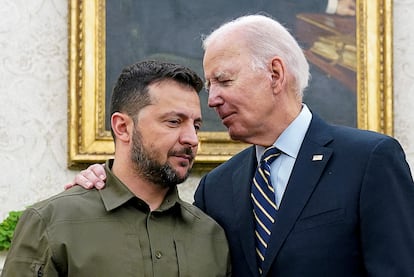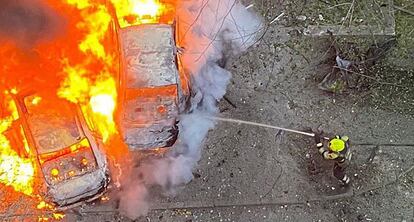Biden authorizes Ukraine to use long-range US missiles in Russia
The move, reported by U.S. media, represents a significant shift in policy by the White House, which until now had rejected such actions in fear of Moscow’s response


The Biden administration has reportedly authorized Ukraine to use U.S.-supplied weapons to strike deeper into Russian territory, according to Reuters, The New York Times, and The Washington Post. This decision marks a significant shift in Washington’s stance on the war; previously, the White House opposed Ukraine attacking targets far from the border due to concerns that such actions might provoke a strong response from Moscow.
According to Reuters, citing “people familiar with the matter,” Ukraine is expected to launch its first long-range attack on Russian soil in the coming days, using Army Tactical Missile System, or ATACMS, that the U.S. began supplying earlier this year.
This change in U.S. policy comes just two months before Donald Trump is due to take office on January 20. Trump has spoken highly of Russian President Vladimir Putin and claimed that, if elected, he would end the conflict within a day, though he has not provided specific details on how he would achieve this. Trump’s future vice-president, J.D. Vance, has hinted that a resolution might involve Ukraine ceding some of its occupied territories.
Neither the White House nor the State Department has officially confirmed the reported authorization. The news broke while President Biden was in Manaus, deep in the Brazilian Amazon, emphasizing the urgency of climate action ahead of the G20 summit in Rio de Janeiro. After the news broke, Biden made a brief appearance before the press in the rainforest, where he issued a statement focused solely on environmental issues and declined to take questions.
The shift in U.S. policy — long advocated by Ukrainian President Volodymyr Zelenskiy but a source of division among Washington experts — came just hours after Russia resumed extensive shelling of Ukraine’s energy infrastructure. It also follows reports of Russia’s decision to deploy North Korean soldiers, estimated at around 10,000 by U.S. intelligence, for combat operations. Washington has repeatedly expressed its concern over the involvement of these troops, warning of significant repercussions for both Eastern Europe and the Asia-Pacific region. The White House had previously indicated that North Korean soldiers, if engaged in combat, would be considered legitimate targets for Ukrainian forces.
According to reports, the aim of these strikes is not necessarily to shift the course of the war, but to demonstrate to the Russian military that they are vulnerable and to deter North Korean leader Kim Jong-un from sending additional troops. Pyongyang already backs Moscow by producing and shipping ammunition and other military supplies. The issue of North Korean involvement was a focal point during President Biden’s meeting with Chinese President Xi Jinping on Saturday in Lima, where Biden urged Beijing — North Korea’s longstanding ally — to exert pressure and prevent further troop deployments.
The decision to allow U.S. weapons to be used within Russia could provide strategic advantages for Ukraine at a critical phase in the conflict, where Russia is on the offensive and Ukraine is struggling to replace its battlefield losses with soldiers with enough experience. It may also enhance Kyiv’s position in any future peace negotiations.
The White House said that it hopes to strengthen Ukraine during the transition of power, and that Biden had discussed the importance of supporting the country to President-elect Donald Trump, when the two met last Wednesday. “Our approach remains the same as it’s been for the last two and a half years, which is to put Ukraine in the strongest possible position on the battlefield so that it is ultimately in the strongest possible position at the negotiating table,” National Security Adviser Jake Sullivan told CBS’s Face the Nation.

Richard Grenell, Trump’s former national security adviser and current campaign member, criticized Biden’s move on the social platform X. “Escalating the wars before he leaves office,” he posted.
Conversely, Polish Foreign Minister Radek Sikorski praised the decision. “President Biden responded to the entry of North Korean troops into the war and the massive Russian missile strike in a language that V. Putin understands — by removing restrictions on Ukraine’s use of Western missiles,” he posted on X.
The first time the U.S. authorized the use of American weapons on Russian soil was in May, albeit on a much smaller scale. At that time, after Russia’s assault on Kharkiv, the second-largest city in Ukraine, Washington approved the use of HIMARS air defense missiles with a range of approximately 50 miles, in the Russian border area. Zelenskiy argued that Ukraine needed to respond to shelling coming from inside Russian territory, but the U.S. did not approve the measure, fearing Russian retaliation.
“This policy change is long overdue,” Michael McFaul, former U.S. ambassador to Moscow under president Obama and now a Stanford University professor, shared on social media. “Article 5 of the United Nations Charter gives Ukraine the right to self-defense. We must retire the strange logic that Russia can attack Ukraine from anywhere within Russia, but Ukraine cannot strike back. Fears of escalation, including Russia’s use of tactical nuclear weapons, prompted concerns about lifting the ban. However, the probability of such an escalation — which, in my view, was always low — is now even lower given Trump’s victory in the U.S. presidential election. There is absolutely no way Putin is going to use a nuclear weapon against Ukraine just weeks before Trump’s return to office. Therefore, there is no downside to lifting this constraint today.”
Jennifer Kavanagh, from the conservative think tank Defense Priorities, disagreed. “The move will not meaningfully improve Ukraine’s military position, but it will intensify U.S. and NATO entanglement in the conflict and worsen the risk of Russian escalation — including possible retaliation on U.S. or European targets,” she said in a statement.
Sign up for our weekly newsletter to get more English-language news coverage from EL PAÍS USA Edition
Tu suscripción se está usando en otro dispositivo
¿Quieres añadir otro usuario a tu suscripción?
Si continúas leyendo en este dispositivo, no se podrá leer en el otro.
FlechaTu suscripción se está usando en otro dispositivo y solo puedes acceder a EL PAÍS desde un dispositivo a la vez.
Si quieres compartir tu cuenta, cambia tu suscripción a la modalidad Premium, así podrás añadir otro usuario. Cada uno accederá con su propia cuenta de email, lo que os permitirá personalizar vuestra experiencia en EL PAÍS.
¿Tienes una suscripción de empresa? Accede aquí para contratar más cuentas.
En el caso de no saber quién está usando tu cuenta, te recomendamos cambiar tu contraseña aquí.
Si decides continuar compartiendo tu cuenta, este mensaje se mostrará en tu dispositivo y en el de la otra persona que está usando tu cuenta de forma indefinida, afectando a tu experiencia de lectura. Puedes consultar aquí los términos y condiciones de la suscripción digital.








































